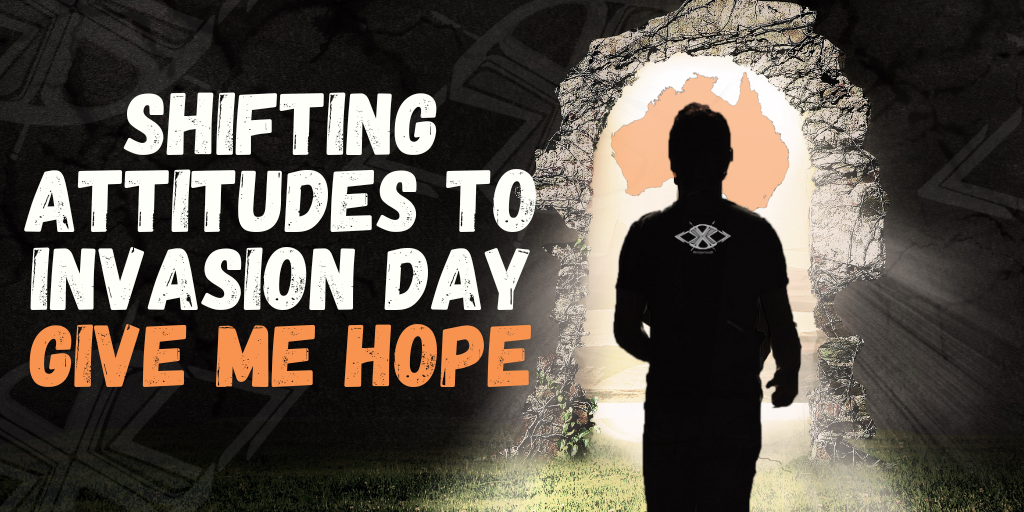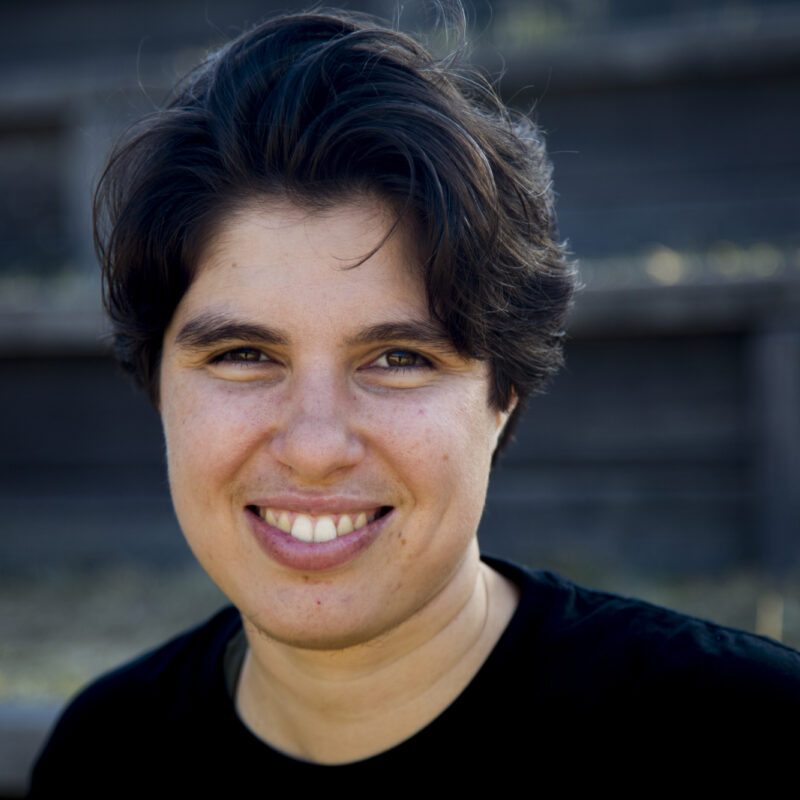Shifting Attitudes to Invasion Day Give Me Hope

Growing up in the early 1990s, Australia Day celebrations were everywhere. It was a huge commodity largely felt through the local community, school, and social circles. There was intense pressure to engage in this day through activities promoting an empty patriotism that pressed against a legacy of genocide. My family resisted this pressure which resulted in a feeling of palpable tension.
What is there to celebrate? I wondered from an early age, as the way we spent Invasion Day in my grandmother’s house was largely different to what was happening outside.
Outside of our Murri home, Australian flags swung heavy and loosely on stolen land. Barbeques and pool parties boomed on every street corner. The sound of fireworks splitting the sky and water bombs hitting the pavement. Crowds of people drinking and eating to excess. Beaches piled up with bodies sweating in Australia Day towels, boardies and bikinis. The exaggerated adornment of blue, red and white and green and gold in stores and homes and bodies were like a sucker punch to the gut. Most of my school mates and their families were celebrating outside and I was at home inside. This date also often acted as the last day of the long summer holidays so I started the first week of school at a point of juxtaposition to the other kids, excluded from their experiences, and they mine.
We were quiet on this day. We did not turn on the TV. The table was ordinary and the food what we would eat on any other day. One thing different was that I felt like my grandmother held me closer on that day. It was like we were just waiting for it to be over, camped in our tiny dining room and avoiding venturing out. In this house we could be ourselves, safe from the outside.
When we were younger, it felt like grief without those exact words. Not only did I consider my ancestors, and mourned those who had been killed, all of the racialised grievances built up in a twelve-month period accumulated and weighed down heavy on this day. Perhaps this is why little was said. It was better to listen to those who were no longer with us.
Participating in the celebrations felt like a mandatory subscription, and anyone who wanted to get out of it was automatically shamed. The experiences of First Nations people and people of colour are heightened on this day through what Palestinian professor Nadera Shalhoub-Kevorkian calls ‘occupation of the senses’. Slogans, chants, posters, flags, sausage sizzle and other auditory, visual and olfactory stimuli feel like oppressive reminders of the racism and ongoing colonisation in this contentinent. These reminders carry a weight.
I was in upper primary school when I realised Australia’s national day was celebrated on the day of the 1788 landing of the First Fleet in Sydney Cove. I was angry. When I learnt how recently the national day had been changed to be celebrated on Jan 26, I was also angry.
Australia Day, the teacher said. How lucky we all are to be Australian.
Survival Day, I remember saying this for the first time, my lips sticky with heat. The date has been mourned by mob publicly since at least the 1938 Day of Morning, the sesquicentenary (150th anniversary) of the British colonisation of Australia. This is not a day for rejoicing for First Nations mob. It marks the start of a devastating loss of life and Country of which we are the living reminders of.
We have survived, I texted Aunty.
She responded, No, darling. We have not just survived. We have thrived.
Invasion Day, I walked over the bridge in a small crowd of people wearing red, black and yellow and blue, green and white. The marches were small in size back then. Small enough for me to be interviewed on television, a microphone shoved in my face.
Not a day to celebrate. Australia is celebrating genocide!
Decades later crowds of thousands swelled over the bridge and protest poetry hung in the wet air. It took a lot for non-Indigenous Australians to listen to mob. I’m sure many of us feel weary for it.
Jan 26. More recently, a few of my non-Indigenous friends told me they have stopped observing this date as a public holiday and go to work as per usual. I still haven’t been able to ignore the painful significance of the date. Call it invasion not settlement / call it genocide not colonisation / call it theft not establishment / don’t call January 26 Australia Day.
Change the date. I used to think this was the answer to the conflict of the day. But another date would feel like a flimsy Band-Aid on a much bigger wound.
Abolish Australia Day. ‘You want a day to celebrate Australia. I want an Australia that’s worth celebrating,’ Luke Pearson wrote. There is so much inequality that needs to be addressed as we call for truth and justice. What country do we want to live in?
Progress always comes with a reactionary response and those who support the celebrating of the day cling tightly to the status quo. In what would mark the first of many significant shifts, radio broadcaster Triple J changed the day of the hottest 100 in 2017, moving away from Jan 26, following public pressure, consultation with Indigenous organisations and a national survey. Triple M responded by creating an Ozzest 100 countdown which has since been scrapped. Several councils such as City of Yarra and City of Darebin decided to no longer refer to 26 Jan as Australia Day, instead acknowledge Aboriginal and Torres Strait Islander culture and history. The Inner West Council in New South Wales, City of Mitcham in South Australia and City of Greater Geelong also joined to oppose the date of Australia Day a few years later.
This year, the annual lamb advertisement by Meat & Livestock Australia did not explicitly mention Australia Day for the first time while Woolworths and Big W said they would cut down on stock of Australia Day merchandise this year due to gradual decline in sales. This led Opposition Leader Peter Dutton to tell Australians to boycott Woolworths. The day after, I saw a man at my gym wearing an Australia Flag towel around his shoulders and wondered if it was a purposeful gesture.
Dutton and other conservative politician’s comments about the change stoked a nationalist flame and perhaps predictably, a few days later, a Brisbane Woolworths store was the target of pro-Australia Day graffiti and a lighted flare. While on social media, paid advertisements about not changing the date run by Liberal, United Australia and Australian Christian Lobby MPs dominate the landscape compared to advertisements that call for a change.
It feels like many were more outraged at supermarkets for stocking less merch than they were about rising prices of groceries and pressure on the cost of living. Is white Australia really that insecure about its national identity that it needs to cling to a flimsy union jack party hat that screams cheap and nasty?
Tension about the celebration of this day is burdensome, especially as it makes people feel unsafe. However, it does hold a mirror up to a nation with the past rising to the surface. There are truths that no-one on this continent can fully ignore. Denialism is a choice.
I spend the day in reflection, in protest, with family, and by myself. Sharing solidarity with other colonised people. Texting my friends and not reading the news. Sometimes I put on the tennis and sometimes I write. I can breathe better when the day is over. I can wash myself off from the dross and start the year.
In my lifetime of three decades, I can’t think of many other cultural yardsticks that have shifted in the public attitude more than Jan 26. A 2022 poll conducted by The Guardian suggested even then only 27% said they celebrate “Australia Day” which is a gradual drop over the last few years. In the same survey, 57% of respondents supported changing the day or keeping it and establishing a separate day to recognise First Nations people.
Many people have changed their minds about celebrating this day. There is growing dissatisfaction with the public holiday. Some non-Indigenous people are listening to and engaging with anticolonial perspectives and respecting mob. Tacky nationalism is no longer as profitable as it once was. Celebration is no longer mandatory in many settings. A younger generation is changing the landscape and conversations are happening on a local and national level.
This gives me hope for the future, and makes me believe other progress could be possible. Perhaps we can shift more than just attitudes towards this date. Perhaps we are moving to something more significant.
I still feel grief and anxiety on this day. A lot of us always will. But I also feel like we as mob are not holding it on our own and that the colonial fantasy world outside has been pierced by truth and lies on the hot ground like a deflated Australian flag floatie.




